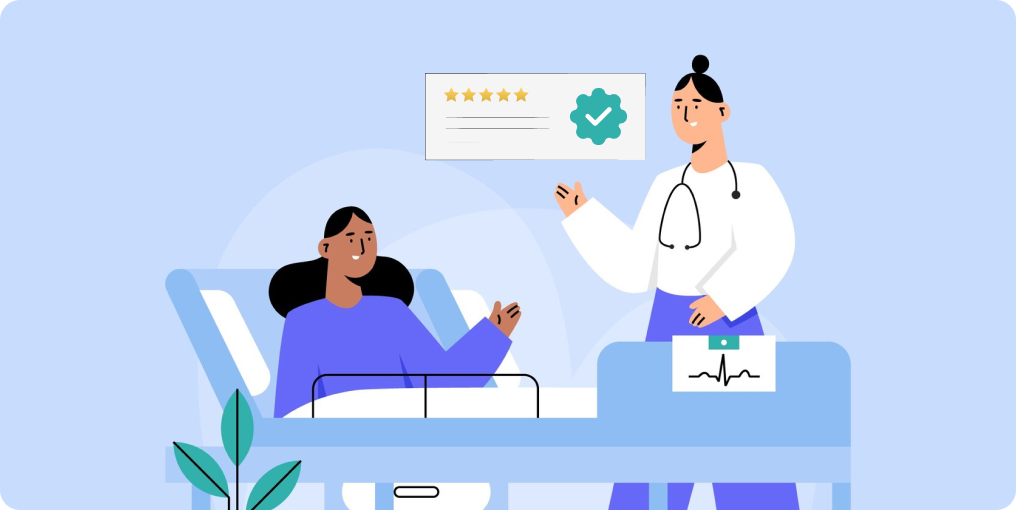Navigating Patient Reviews in Healthcare: Challenges and Solutions for Doctors

Patient reviews have become indispensable in healthcare, shaping how clinics and doctors build credibility and trust with their patients.
Why?
Honest feedback from patients, in the form of user-generated content (UGC), does more than just improve a provider’s ranking. It opens a window into genuine patient experiences, allowing others to understand a doctor’s approach, empathy, and skill from a human perspective.
With the power of reviews, doctors can significantly improve how potential patients find and choose them, making converting visitors into loyal patients easier.
This trust factor, created by UGC, builds credibility, humanizes the provider, and strengthens patient engagement while also boosting online visibility—doctors show up on Google searches when people search for them.
Did You Know? 80% of people inspect five or more reviews before deeming a provider to be trustworthy.
But here’s the challenge: both large hospitals and smaller clinics often struggle to gather patient reviews at the individual doctor level.
While many large healthcare institutions have systems in place to collect reviews for the hospital itself, replicating this mechanism for each doctor within their setup remains a gap. This is particularly significant given that searches for doctors or specific conditions occur 2-3 times more frequently than searches for hospitals, making doctor-specific reviews critical for patient trust and engagement.
Patients and caregivers are not just searching for a nearby hospital—they’re looking for doctors with specific expertise, a personal touch, and trustworthy feedback.
When choosing a specialist, patients want to know: “Who’s the best doctor for my condition?” “What are other patients saying about them?” In fact, 92% of buyers believe in reviews and personal stories over traditional ads.
Top Review Platforms for Healthcare Providers like Google, Healthgrades, and WebMD have made it easier to search for doctors individually, allowing prospective patients to research the hospitals and the people within them.
Additionally, healthcare choices tend to be close to home, with many patients searching within just a few miles of their location.
In fact, nearly one in three healthcare searches is highly localized. For doctors, this means that a trusted online presence, backed by genuine reviews, is key to reaching patients nearby and ace the hyperlocal search. After all, UGC is 8.7x times more powerful than influencer content and 6.6x more influential than branded content.
Why Doctors Have Fewer Reviews Compared to Healthcare Institutions
Hospitals, with vast resources and dedicated marketing teams, often prioritize branding the institution as a whole rather than highlighting individual doctors. While they do recognize the importance of practitioner listings and physician reputations, the focus tends to be on the hospital’s overall reputation and visibility in the community.
For most hospitals, investing in reviews and reputation management is mainly about promoting the institution’s image rather than managing and promoting each doctor’s individual feedback. This approach leaves many doctors with fewer reviews despite their critical role in patient care and satisfaction.
Beyond the hospital’s focus, several unique challenges make it difficult for doctors to gather patient reviews:
1. Patient Sensitivity and Privacy Concerns
Healthcare is a deeply personal experience, and patients may feel uncomfortable sharing details publicly, especially if it involves sensitive or private conditions.
2. Less Frequency, More Personalization
Unlike high-traffic hospitals, individual doctors often see fewer patients, with each interaction being highly personalized. This creates a unique, meaningful experience but reduces the volume of reviews.
3. Longer Trust-Building Process
Building a relationship with a doctor can take time, as patients often need multiple visits before feeling confident in their care. This slower process means they might delay leaving a review until trust has fully formed.
4. Complexity of Experience
Healthcare journeys are often intricate, involving multiple diagnosis, treatment, and follow-up stages. Patients may struggle to encapsulate these complex experiences in a simple review, making it less likely for them to leave feedback.
Strategies to Overcome the Review Generation Challenge
To overcome these obstacles, doctors need a proactive strategy to make leaving a review easy and comfortable for patients.
Here are some ways doctors can boost their review counts:
1. Patient-Friendly Review Requests
Simplify the process by using friendly language and clear instructions, effortlessly guiding patients. A well-crafted social media presence can amplify this approach by encouraging satisfied patients to share their feedback online, significantly enhancing local SEO and visibility for your practice.
2. Offering Anonymity Options
Respect patient privacy by allowing anonymous reviews encouraging more people to share their experiences without hesitation.
3. Streamlining the Review Process
Review Management Platforms like Zceppa simplify the process, enabling quick and direct reviews through a user-friendly interface and reducing friction in the review journey.
4. In-Moment Automation
Automate review requests right after a patient’s visit—while the experience is still fresh. Automation boosts response rates and taps into the law of large numbers, maximizing clicks and conversions for valuable feedback.
How Zceppa Helps Doctors Collect Reviews and Enhance Online Reputation
Zceppa is revolutionizing the way healthcare professionals manage their online reputation. Designed for healthcare providers, doctors, or multi-specialty healthcare institutions, Zceppa provides a seamless platform to collect, manage, and respond to patient reviews, helping them craft a trusted personal brand online.
Let’s see how –
1. Automated Review Requests
Imagine prompting patients for reviews automatically right after their visit, without lifting a finger. Zceppa’s automated review requests make this seamless. Patients are asked to leave reviews when their experience is fresh, which leads to more authentic and timely feedback.
2. Privacy-Focused Review Collection
In healthcare, privacy is paramount. Zceppa recognizes this by offering privacy-focused review options, allowing patients to leave feedback anonymously if they prefer. This is a game-changer for patient comfort, especially in sensitive medical areas, and encourages more honest feedback without fear of judgment.
3. UGC Aggregation and Display
How can you maximize the impact of a single review? By ensuring it reaches the right platforms. Zceppa aggregates user-generated content (UGC) across channels and displays it on doctor review sites like Google, Facebook, Healthgrades, and more, ensuring doctors’ reputations are consistent and well-managed across all major channels. This integrated approach ensures no review slips through the cracks and that a doctor’s online presence is cohesive and accessible.
4. Customized Review Reply Templates
Responding to patient reviews thoughtfully is critical yet time-consuming. Not to mention the critical importance of crafting an appropriate reply to a negative review.
Zceppa offers customized AI-driven review reply templates, allowing doctors to respond quickly while retaining that personal touch. This feature doesn’t just streamline responses—it enables doctors to keep the conversation engaging and genuine. With Zceppa’s templates, responses can adapt in tone and content, providing a balanced approach that respects each patient’s feedback.
5. Sentiment Analysis
Have you ever wondered what patients feel beyond star ratings? Zceppa’s sentiment analysis tool dives into the emotional tone behind reviews, offering doctors a window into positive, negative, or neutral patient sentiments. This insight helps address concerns promptly and identifies areas where doctors excel, which can be highlighted to build trust.
The Future of UGC and AI in Brand Strategy
Consumers trust other customers more than they trust brand messaging, and this organic content becomes a powerful tool in shaping a brand’s identity and reputation. Verified Reviews and other modes of UGC profoundly impact building credibility, especially when potential patients see authentic experiences that align with their expectations and healthcare needs.
On the other hand, AI is revolutionizing customer interactions by enabling brands to respond faster, more personally, and with greater relevance.
Zceppa offers a seamless solution for brands looking to capitalize on UGC and AI. By automating the curation of UGC, managing reviews, and facilitating social media publishing, Zceppa empowers brands to orchestrate content at scale.
The platform’s AI-driven technology analyzes customer sentiment, tracks trends, and provides valuable insights into customer preferences. It also ensures that content remains consistent with brand guidelines. Zceppa makes it easier for brands to manage the growing volume of UGC and turn it into deeper customer connections.
The time to integrate AI into your UGC strategy is now — don’t let your brand fall behind.
Signup for a free trial
Zceppa’s products empower your business to win every mobile-first consumer interaction across the buying journey.


